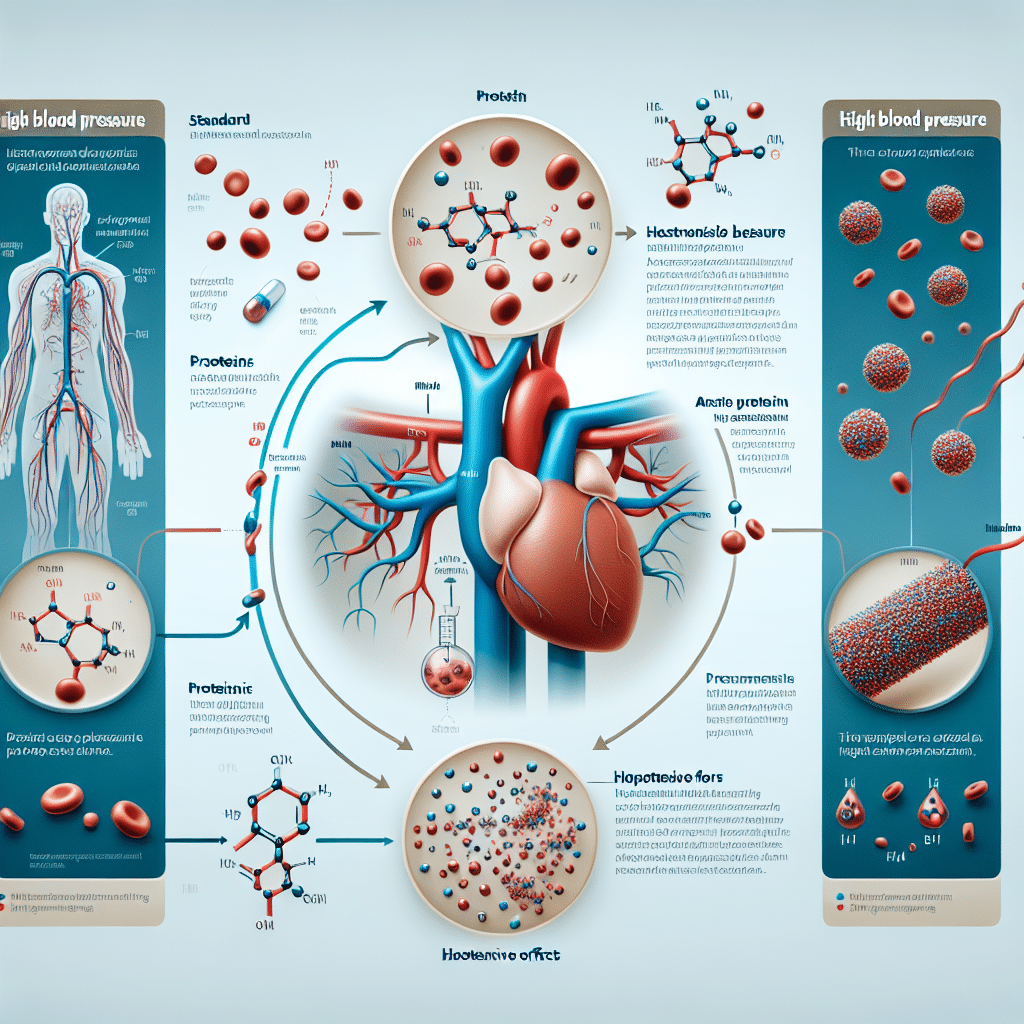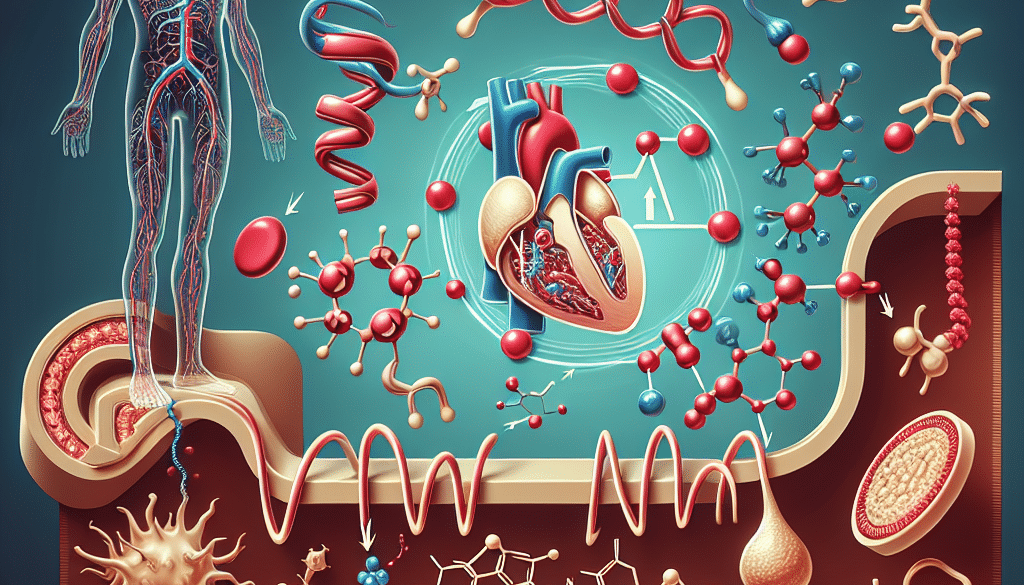Proteins with Hypotensive Effects: Blood Pressure Solutions
-
Table of Contents
- Proteins with Hypotensive Effects: Innovative Blood Pressure Solutions
- Understanding Hypertension and Its Impact
- The Role of Proteins in Blood Pressure Regulation
- Casein and Whey Proteins
- Plant-Based Proteins
- Marine Proteins
- Research Highlights on Hypotensive Proteins
- Practical Applications and Dietary Considerations
- Limitations and Future Directions
- Conclusion: Harnessing the Power of Proteins for Blood Pressure Health
- Discover ETprotein’s High-Quality Protein Products
Proteins with Hypotensive Effects: Innovative Blood Pressure Solutions

Hypertension, commonly known as high blood pressure, is a significant health concern that affects millions of people worldwide. It is a major risk factor for heart disease, stroke, and kidney failure. Traditional treatments for hypertension include lifestyle changes and medications, but recent research has highlighted the potential of certain proteins in managing blood pressure. This article explores the hypotensive effects of various proteins and how they could offer innovative solutions for blood pressure control.
Understanding Hypertension and Its Impact
Hypertension occurs when the force of blood against the walls of the arteries is too high. It can be caused by various factors, including genetics, diet, lack of exercise, and stress. The condition is often referred to as the “silent killer” because it typically has no symptoms until it has caused significant damage to the heart and arteries.
- According to the World Health Organization (WHO), an estimated 1.13 billion people worldwide have hypertension.
- Less than 1 in 5 people with hypertension have the condition under control.
- Hypertension is a major cause of premature death worldwide.
The Role of Proteins in Blood Pressure Regulation
Proteins play a crucial role in the body’s physiological processes, including blood pressure regulation. Certain proteins can have vasodilatory effects, meaning they help to widen blood vessels, which can reduce blood pressure. Others may influence the balance of electrolytes or interact with enzymes that regulate blood pressure.
Casein and Whey Proteins
Casein and whey, proteins found in milk, have been studied for their potential antihypertensive effects. Bioactive peptides released during the digestion of these proteins can inhibit angiotensin-converting enzyme (ACE), which plays a role in blood pressure regulation.
Plant-Based Proteins
Plant-based proteins, such as those from legumes and grains, contain peptides that may also contribute to lowering blood pressure. These proteins are often rich in amino acids like arginine, which is a precursor to nitric oxide, a potent vasodilator.
Marine Proteins
Fish and other marine sources are rich in omega-3 fatty acids and proteins that have been associated with cardiovascular benefits, including blood pressure reduction.
Research Highlights on Hypotensive Proteins
Several studies have demonstrated the potential of proteins in managing hypertension. Here are some notable findings:
- A study published in the “American Journal of Clinical Nutrition” found that whey protein improved blood pressure and vascular function in overweight and obese individuals.
- Research in the “Journal of Nutrition” showed that dietary peptides from casein were effective in reducing blood pressure in hypertensive rats.
- A meta-analysis reported in “Hypertension” indicated that plant-based diets, which are high in proteins from grains and legumes, were associated with lower rates of hypertension.
Practical Applications and Dietary Considerations
Incorporating proteins with hypotensive effects into the diet can be a practical approach to managing blood pressure. Here are some dietary considerations:
- Choose lean sources of dairy proteins, such as low-fat milk or yogurt, to avoid excess saturated fat intake.
- Incorporate a variety of plant-based proteins, including beans, lentils, and whole grains, into meals.
- Include fish in the diet at least twice a week to benefit from marine proteins and omega-3 fatty acids.
Limitations and Future Directions
While the evidence is promising, more research is needed to fully understand the mechanisms by which proteins exert their hypotensive effects. Additionally, individual responses to dietary proteins can vary, and it is important to consider the overall dietary pattern and lifestyle factors when addressing hypertension.
Conclusion: Harnessing the Power of Proteins for Blood Pressure Health
Proteins with hypotensive effects offer an exciting avenue for natural blood pressure management. By understanding the role of these proteins and incorporating them into a balanced diet, individuals may be able to better control their blood pressure and reduce their risk of cardiovascular diseases. As research continues to evolve, we may see more targeted dietary recommendations and functional foods designed to harness the power of these proteins for health.
Discover ETprotein’s High-Quality Protein Products
If you’re looking to incorporate high-quality proteins into your diet, ETprotein offers a range of organic and plant-based protein products that can support your health goals. Their products are non-GMO, allergen-free, and cater to various industries, including nutraceuticals and food and beverage. With a commitment to quality and customer satisfaction, ETprotein is a trusted supplier for those seeking to manage their blood pressure through dietary proteins.
About ETprotein:
ETprotein, a reputable protein Chinese factory manufacturer and supplier, is renowned for producing, stocking, exporting, and delivering the highest quality organic bulk vegan protein and plant proteins. They include Organic rice protein, clear rice protein, pea protein, clear pea protein, pumpkin seed protein, sunflower seed protein, mung bean protein, peanut protein etc. Their offerings, characterized by a neutral taste, non-GMO, allergen-free attributes, cater to a diverse range of industries. They serve nutraceutical, pharmaceutical, cosmeceutical, veterinary, as well as food and beverage finished product distributors, traders, and manufacturers across Europe, USA, Canada, Australia, Thailand, Japan, Korea, Brazil, and Chile, among others.
ETprotein specialization includes exporting and delivering tailor-made protein powder and finished nutritional supplements. Their extensive product range covers sectors like Food and Beverage, Sports Nutrition, Weight Management, Dietary Supplements, Health and Wellness Products, and Infant Formula, ensuring comprehensive solutions to meet all your protein needs.
As a trusted company by leading global food and beverage brands and Fortune 500 companies, ETprotein reinforces China’s reputation in the global arena. For more information or to sample their products, please contact them and email sales(at)ETprotein.com today.














